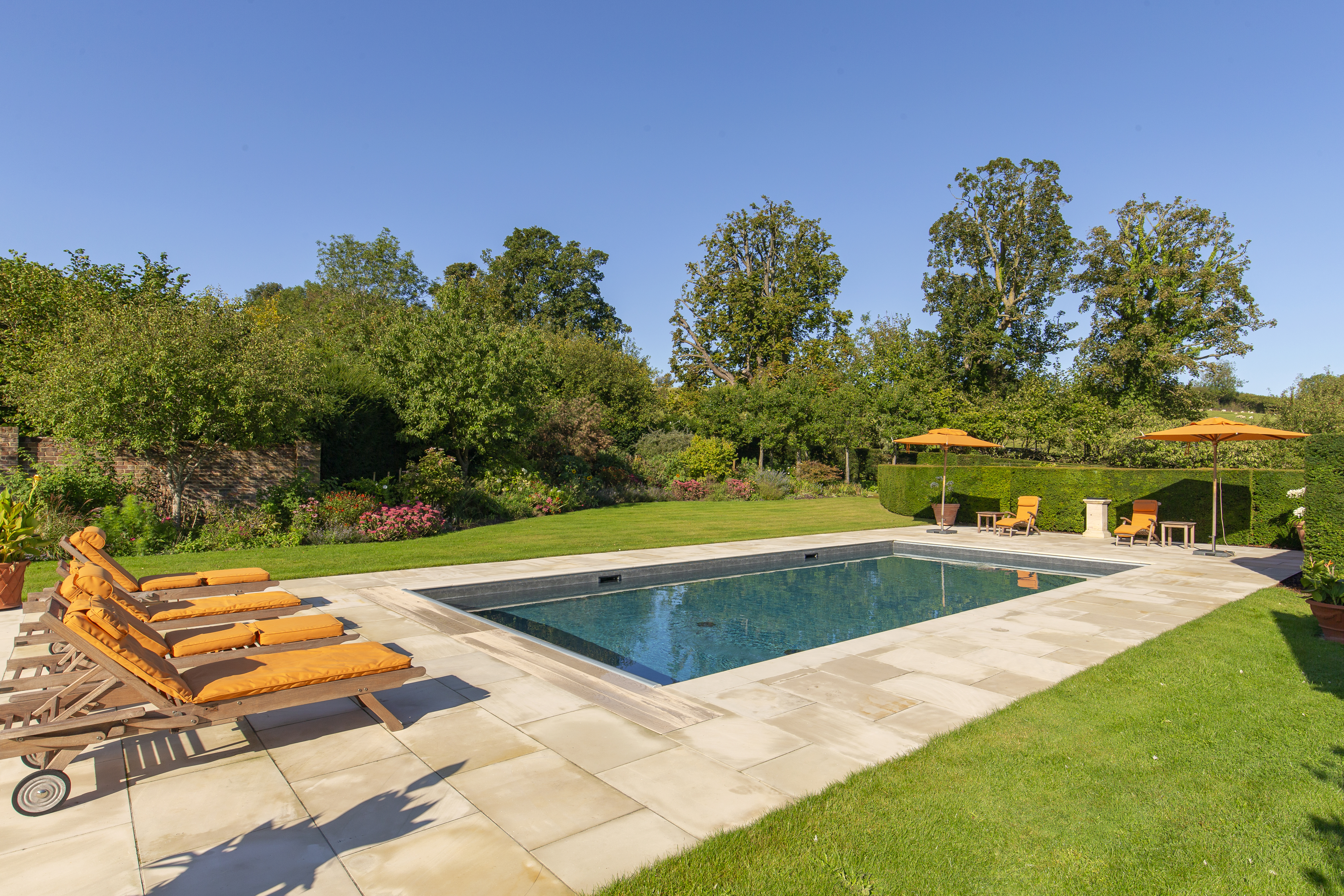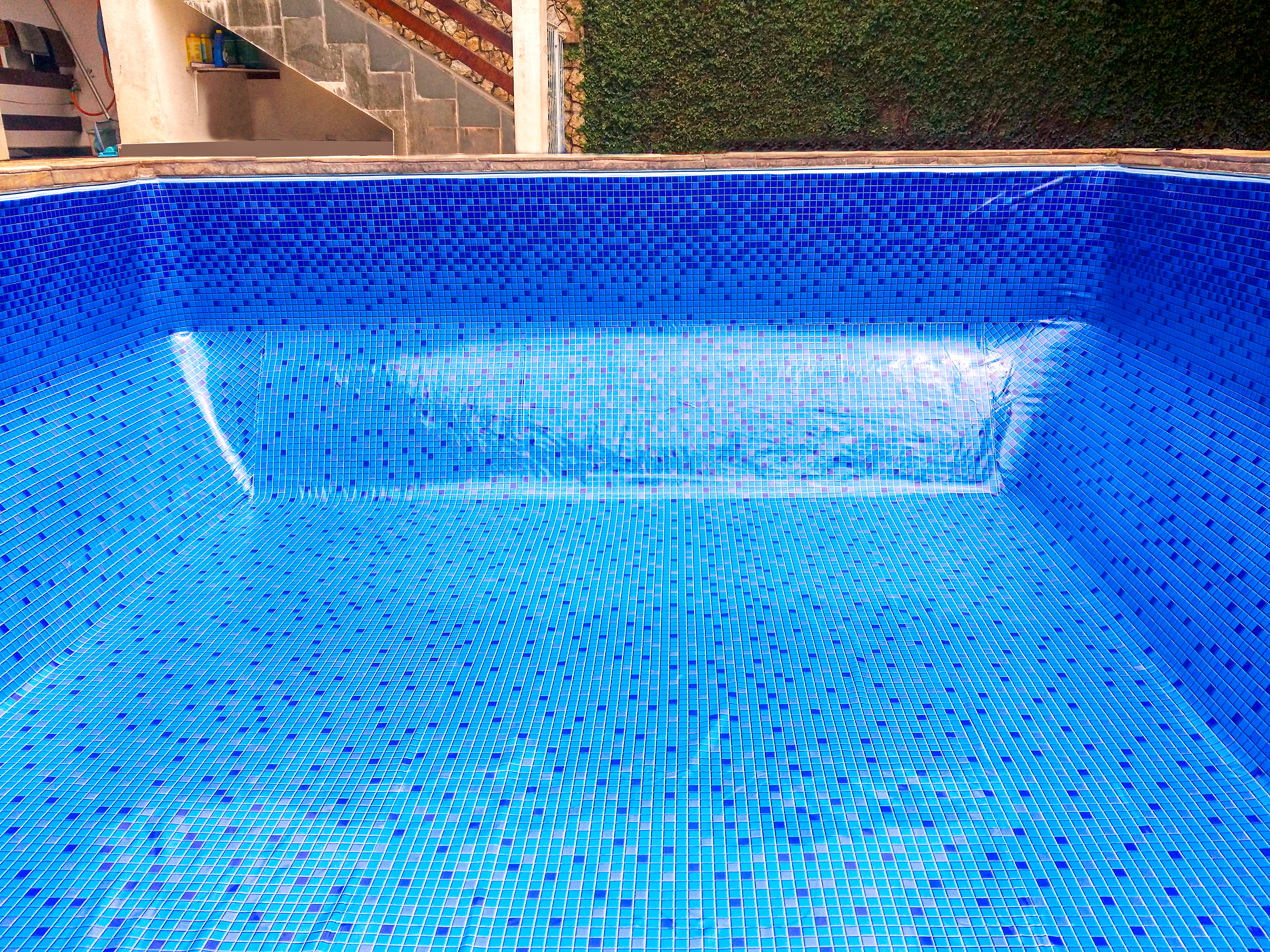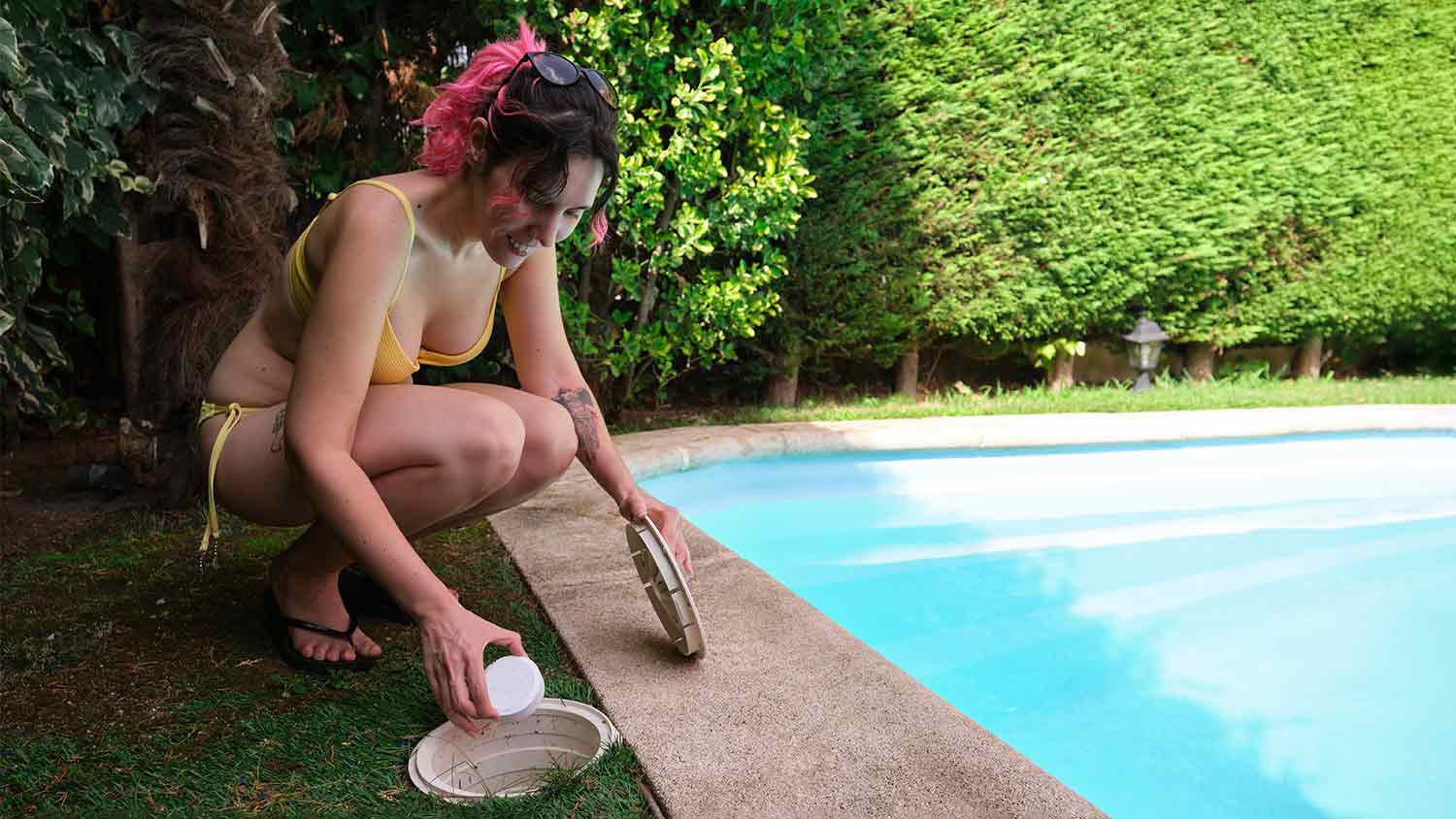
Are you looking to install a swimming pool? This guide will help you estimate your in-ground pool costs in Atlanta so you can stay peachy and cool all summer long.
Resurfacing a pool costs around $11,000, on average, but prices can range from an average of $6,000 to $15,000, depending on the size and type of surface.


Pool resurfacing costs an average of $11,000 for a pool measuring 1,000 square feet
Most homeowners will pay somewhere between $6,000 and $15,000 for pool resurfacing.
Materials range from $1 to $30 per square foot, including everything from pool paint to high-end tiles.
Expect to pay between $45 and $65 per hour in labor fees.
Other factors affecting the pool resurfacing cost include pool size, resurfacing materials, pool type, and additional features.
Pool resurfacing costs $11,000 on average for a pool measuring 1,000 square feet. But most homeowners pay somewhere between $6,000 and $15,000 depending on size, type, finish, and your location. However, the end result will be a beautifully updated pool customized to your family’s wants and needs that you can enjoy for years to come.

When planning a pool refinishing project, it's a good idea to get a sense of where your money is going so you can see if there's anywhere you can save or where you have room to spend a little more for a better or more durable end result.
On average, it costs between $45 and $65 per hour in labor to refinish a pool. However, your costs may vary based on your location and the job's complexity.
The bigger the pool, the more it costs to repair. For example, resurfacing a concrete pool costs roughly $6,500 per 1,000 feet. So, if you have a 2,000-square-foot pool, you're looking at a total resurfacing cost of $13,000.
Here’s a breakdown of pool resurfacing costs based on size:
| Pool Size | Average Cost to Resurface |
|---|---|
| 6-by-8 ft. | $320 |
| 8-by-12 ft. | $630 |
| 8-by-20 ft. | $1,100 |
| 10-by-8 ft. | $520 |
| 12-by-20 ft. | $1,600 |
| 16-by-32 ft. | $3,400 |
| 18-by-36 ft. | $4,200 |
| 20-by-40 ft. | $5,200 |
Plaster, if applied properly, lasts 10 years and costs $4 per square foot, while pebbles—one of the most durable aggregate options—have a lifespan of 20+ years and a cost of $10 per square foot. At the top end are tiles, which average around $25 per square foot but can climb up to $35 or more for high-end tiles. However, they typically last the longest.
Pool paint costs around $1 per square foot, but it won't last as long as other materials, with a lifespan of just two to five years. Even with perfect water chemistry and high-quality Epoxy paint, the hardest-wearing pool paint won't last longer than seven years before it needs reapplying.
Overall, the cost of materials to refinish your pool varies significantly based on quality, lifespan, durability, and rarity.
Here’s a breakdown of material costs for pool resurfacing:
| Material | Average Cost (per sq. ft.) |
|---|---|
| Glass tile | $1–$35 |
| Large aggregate | $10 |
| Paint | $1 |
| Plaster | $4 |
Tiles are beautiful and incredibly durable, but they're also the most expensive. So if you want a completely tiled pool, be prepared to invest more in your pool remodel cost. However, a tiled finish is easy to repair; if a tile breaks, you can just get that one replaced. If you want the beauty of tile without the sticker shock, you can just tile above the waterline and use a more affordable finish below.
Paint is the lowest-cost, but least durable option. Plaster is a good middle ground because it’s reasonably durable and cost-effective. Aggregate adds a luxury look and, while pricier than plaster, costs much less than tile.
Below is a breakdown of pool resurfacing costs for different finishes:
| Finish Type | Cost |
|---|---|
| Repainting | $1,500 per 1,000 sq. ft. |
| Replastering | $5,500 per 1,000 sq. ft. |
| Resurfacing with aggregate | $6,500 |
| Refinishing with tiles | $30,000 per 1,000 sq. ft. |
Drain, Clean, and Refill: This costs between $175 and $225, plus $250 for cleaning. Refilling your pool after costs around $55 per 5,000 gallons.
Location: Pools are very popular in warm climates, so resurfacing demand will be higher than in colder climates, driving up costs. The location of your pool on your property also matters — if it’s difficult to access, your contractor may charge more for labor.
Customizations: Basic resurfacing costs are around $6.50 per square foot. However, if you have a custom pool design, unique angles, or other challenging factors, your resurfacing cost will likely increase. The longer it takes to install, the more you’ll pay for labor.
Pool Type: Vinyl pools cost the least to resurface since you’re not technically resurfacing them but actually replacing the pool liner. Concrete and fiberglass pools are more costly because of the time and materials required for the refinishing.
After installation, resurfacing is one of the highest swimming pool costs you'll face, and how much it costs depends on the type of pool you have. Each pool type and finish has different time, labor, and material costs. Vinyl pools generally cost the least, with concrete (often called gunite) pools costing the most to resurface.
Fully resurfacing fiberglass pools costs an average of $6,500 per 1,000 square feet. If, however, you just want a new gel coat with a painted topcoat, which is enough to cover minor scratches and dings, you'll pay around $1,000 to $1,200.
Available finishes for fiberglass pools include:
Paint: Epoxy paint is a popular finishing option that you can do yourself or hire a pro to take on for you. It's relatively affordable compared to other finish types and typically costs $1 to $2 per square foot, including labor.
Aggregate: Aggregate finishes usually comprise quartz, pebbles, glass beads, and/or crushed stone. This finish type typically costs $5 to $7 per square foot.
Tile: Tile is among the most expensive finish types, but it's also the most durable and long-lasting. It usually costs anywhere from $4 to $30 per square foot, depending on the type.
Concrete pools usually cost around $6,500 per 1,000 square feet, but costs vary depending on the finish you choose. Choosing pricier materials, and those that need a lot of time or labor to install, can quickly rack up costs, so make sure you speak to a local pool repair pro for an accurate quote.
Available finishes for concrete/gunite pools include:
Paint: Paint finishes are also available for concrete/gunite pools and typically costs $1 to $2 per square foot.
Plaster: Plaster is usually composed of marble aggregate, sand, and cement. It typically comes in white, but some manufacturers offer additional colors. This finish type costs between $5 and $6 per square foot.
Aggregate: Aggregate is comparable in price to plaster, usually costing around $5 to $7 per square foot, but some aggregate types can cost more.
Tile: You can expect to pay anywhere from $4 to $30 per square foot to finish your pool in tile. Glass tiles are usually the most expensive, while ceramic and porcelain are most affordable.
You don't technically refinish vinyl pools. Instead, you replace the whole liner, which costs between $1,000 and $3,500 per 1,000 square feet. It’s sometimes possible to carry out repairs instead if you find a leak in a pool liner, but a full replacement might be more cost-effective in the long run.
In addition to basic resurfacing prices, it's helpful to consider associated costs that might come with a resurfacing project. For instance, if you're making other repairs or installing additional features, you'll want to factor those costs into your overall budget.
The cost to repair a swimming pool usually ranges anywhere from $240 to $1,200, but it might be more or less expensive depending on the repairs you need. Minor repairs, like pump motor repairs, typically cost between $50 and $300, while replacing a pool filter usually costs $1,500 to $2,000.
All types of pools require some time and money for upkeep. However, the material you choose for your pool resurfacing project will affect your ongoing maintenance costs and the amount of effort you’ll need to put in.
Pool paint is likely going to require the most maintenance to prevent fading, chipping, and peeling. The repairs will be time-consuming, but they will be the most affordable.
Plaster and aggregate are durable and shouldn’t require frequent repairs, but when they do need repair, you’ll need to call in a professional and pay a few hundred dollars, on average. Repairing pool tiles is going to cost about the same, but the repairs needed should be few and far between. Because plaster, aggregate, and the grout between tiles are porous, they tend to encourage algae growth, necessitating frequent cleaning.
Vinyl is one of the easiest pool surfaces to keep clean because it is smooth and non-porous, so it naturally limits algae growth. But repairing a vinyl liner will usually be the most expensive, averaging between $200 and $600, depending on the extent of the damage and where it’s located.

While beautifying your pool with a new surface, maybe you want to enhance it even further with additional features. Common add-ons include lighting, decking, and fencing.
Lighting: New pool lights cost anywhere from $500 to $900, but most homeowners will pay around $625 per light. LED pool lights usually cost the most, while incandescent bulbs cost the least. Additional features, like color-changing technology, will further increase costs.
Water heater: If you want to extend your swimming season or simply make it more comfortable, consider installing a pool heater. Pool heaters cost between $1,800 and $4,200 to install based on the size and type of pool you have.
Decking: A new deck can enhance the look of your pool while making it safer and more comfortable to walk around it. Pool decks cost between $3,000 and $12,000, depending on the deck's size.
Fencing: Pool fences can help prevent accidents, so they're an important safety measure, especially for households with kids and pets. The cost of pool fencing ranges from $1,500 to $10,000 based on the fence's size and materials.
Water features: You can add water features to your pool to make it more fun and inviting, such as a waterfall, waterslide, or fountain. Depending on the type you choose, you can expect to pay between $450 and $1,900.
With the exception of minor repairs, resurfacing a pool is a large and complex task that's generally not suitable for DIY work. While it can appear that you could save hundreds or thousands of dollars on the project by doing it yourself, hiring a local pool resurfacing professional to perform the job ensures you'll avoid potentially costly errors and provides the appearance and functionality that only an expert can deliver.
Pool resurfacing generally overwhelms the skills of average DIYers, so here's why it's best to hire a pro:
Licensed contractors have the skills, experience, and tools necessary to ensure your pool resurfacing lasts as long as possible.
Their expertise allows them to identify potential problems with your pool, such as cracks, leaks, or other issues, and address them before work begins.
DIY mistakes can result in potentially costly damage, leaks, or other issues, which can cost thousands to repair later.
Pros have the equipment and gear to keep themselves and your family safe during the process.
Reputable companies provide quality and materials warranties, as well as carry the necessary insurance.
If you want to be a part of your pool refinishing process, you can assist by performing the following tasks:
If appropriate, you can consider taking on small pool repair tasks yourself, such as patching work or replacing a few tiles.
Drain your pool before resurfacing work begins, following local guidelines
Remove furniture, debris, and small structures from around the pool area before work begins
Manage the refilling and balancing tasks after the work is complete
Resurfacing your pool can get expensive quickly, sometimes reaching up to {{nationalMaxCost}} or more. There are a few things you can do to save money upfront and in the long run.
Choose a more affordable finish. You can expect to pay around 20 times more for tile than you would for pool paint, so opting for a less expensive finish material can drastically reduce your expenses. In order from least expensive to most expensive, your options are paint, vinyl, aggregate, plaster, and tile.
Consider maintenance costs. Upfront cost is important, but you should also consider your ongoing expenses. You might pay significantly more for plaster or tile than you would for paint, for example, but they’ll last much longer and might end up costing you less over time in terms of maintenance.
Opt for add-ons at the same time. Finally, if you’ve been yearning to add lighting, a pool heater, decking, or some other improvement to your pool, you may be able to save money by bundling the job in with your resurfacing project.
Be ready to describe to your contractor the type and approximate size of your pool.
Talk with your contractor about resurfacing materials, including what you currently have and any options, to fit your needs, pool type, and budget.
Confirm the specifics of your contract or pricing estimate, including responsibilities, such as pool draining, refilling, balancing, and clean-up work.
Go over details with your contractor, including project timing, warranties, and maintenance requirements after the fact.
Home is the most important place on earth, which is why Angi has helped more than 150 million homeowners transform their houses into homes they adore. To help homeowners with their next project, Angi provides readers with the most accurate cost data and upholds strict editorial standards. We extensively research project costs to develop the pricing data you see, so you can make the best decisions for you and your home. We rely on reputable sources, including the U.S. Bureau of Labor Statistics, academic journals, market studies, and interviews with industry experts—all to ensure our prices reflect real-world projects.
Want to help us improve our cost data? Send us a recent project quote to [email protected]. Quotes and personal information will not be shared publicly.
From average costs to expert advice, get all the answers you need to get your job done.

Are you looking to install a swimming pool? This guide will help you estimate your in-ground pool costs in Atlanta so you can stay peachy and cool all summer long.

Georgia has a longer-than-average swimming season, so make sure you’re prepared. This guide runs through pool liner replacement costs in Atlanta.

A pool remodel can transform your entire yard. Find out average pool remodel costs in Atlanta and get your project rolling.

Install a pool liner by draining the pool, removing the old liner, and laying the new one. Keep reading to learn how to install a pool liner like a pro.

Our chlorine calculator helps you determine the exact amount of chlorine to add to your pool, based on its volume and your desired parts per million (ppm) level.

Swimming pool issues like algae or a clogged filter can happen to anyone. Learn more about common pool problems and how to fix them quickly and easily.